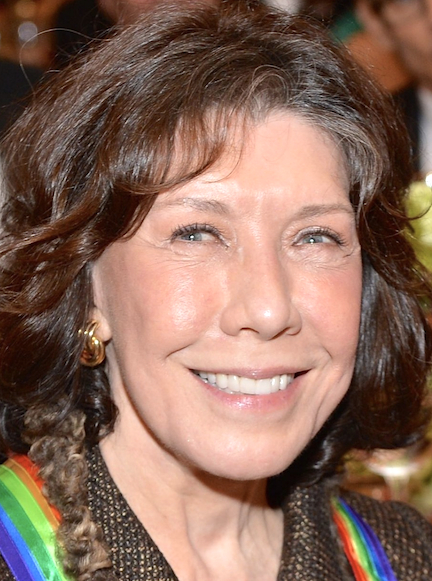On this date in 1939, Mary Jean “Lily” Tomlin — actress, comedienne, writer, singer and producer — was born in Detroit (on the day Nazi Germany invaded Poland, starting World War II). Her Southern Baptist parents, Lillie Mae (Ford) and Guy Tomlin, were respectively a nurse’s aide and a factory worker who had moved to Detroit from Paducah, Ky., during the Great Depression.
“We were a working-class family,” she told the Irish Times in 2015. “My parents didn’t pay that much attention. They let us go our own way. In our neighborhood, the boy was okay if he didn’t end up in jail and the girl was okay if she didn’t get pregnant. That was the credo by which we lived.” She grew up “very well acquainted with the Bible and scripture.”
She enrolled after high school at Wayne State University to major in biology before switching to theater. Moving to New York without graduating, she worked as a bookkeeper and performed stand-up and off-Broadway using her mother’s first name to honor her, with the spelling changed slightly. (A guaranteed laugh line: “Why is it that when we talk to God we’re said to be praying, but when God talks to us we’re schizophrenic?”)
Tomlin’s first TV appearances were in 1965-66 on “The Merv Griffin Show” and “The Garry Moore Show.” Her breakout role in 1969 was on the comedy show “Rowan and Martin’s Laugh-In” (replacing Judy Carne). Her signature role Edith Ann was developed by her then-life partner and future wife Jane Wagner. Another major character was Ernestine, a less-than-helpful telephone operator who opened each sketch with “one ringy dingy…” Tomlin left “Laugh-In” in 1973.
She released several top-selling albums in the 1970s and won the 1972 Grammy for Best Comedy Recording. Her film debut was in director Robert Altman’s “Nashville” in 1975 in which she played a gospel singer and mother of two deaf children. She received Best Supporting Actress nominations for Golden Globe and Academy awards.
“The Late Show” with Art Carney in 1977 was a critical success as was “9 to 5” with Dolly Parton and Jane Fonda in 1980, one of the year’s top-grossing films. She landed roles in movies during the next three decades and teamed again in 2006 with Altman in his last film, “A Prairie Home Companion.”
Tomlin starred in 1985 in the one-woman Broadway show “The Search for Signs of Intelligent Life in the Universe,” written by Wagner. It won her a Tony and was made into a feature film in 1991. A Broadway revival in 2000 was followed by a two-year U.S. tour.
Television appearances included voicing Ms. Valerie Frizzle on the animated series “The Magic School Bus” on PBS from 1994-97, a role as the title character’s boss on the sitcom “Murphy Brown” and recurring roles on “Will & Grace,” “The West Wing” and the fifth season of “Desperate Housewives” in 2008–09.
“Lily Tomlin & Jane Wagner, Actor, Writer” says their star, installed in 2012, on the Hollywood Walk of Fame, the 345th star on the walk. They were married the next year on New Year’s Eve in a private ceremony in Los Angeles after 42 years together. Tomlin’s only sibling, her younger brother Richard, is also gay. Commenting on opposition to equal marital rights, she said in 2011 that “so much of it is just out of fear and ignorance or just narrowness of mind.”S
Tomlin starred with Fonda in the 94-episode, seven-season Netflix original series “Grace and Frankie,” which debuted in 2015. They become friends after learning their husbands (Sam Waterston and Martin Sheen) are leaving them to be together romantically. Tomlin and Fonda both received Emmy nominations for Outstanding Lead Actress in a Comedy Series.
In a career spanning over 50 years, Tomlin received seven Emmys, a Grammy and two Tonys, along with a Kennedy Center Honor in 2014 and the Screen Actors Guild Life Achievement Award in 2017.
The Tomlin Endowed Scholarship Fund was established in 1990 at Wayne State University in Detroit.
PHOTO: Tomlin receiving her Kennedy Center Honors Medallion in 2014; State Department photo.

